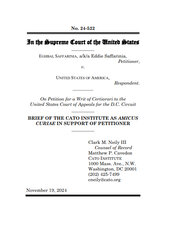The government considered dismissing the § 1519 charges in exchange for Mr. Saffarinia pleading guilty under § 1001, which would likely have yielded a guidelines sentence range of zero to six months’ imprisonment. Mr. Saffarinia declined and was tried by a jury. The government then requested that he be sentenced to 27 months in federal prison. The district court imposed a sentence of a year and a day in prison, followed by a year on supervised release. Mr. Saffarinia appealed his conviction to the D.C. Circuit, which affirmed the district court’s judgment. Mr. Saffarinia filed a petition for certiorari from the Supreme Court.
Cato filed an amicus brief asking the Supreme Court to grant Mr. Saffarinia’s petition and reverse the decision below. The D.C. Circuit’s interpretation of § 1519 is breathtakingly broad in light of Congress’s intent and this Court’s consistent precedent. A narrower construction will properly construe the statute and prevent the government from using it to coerce defendants into surrendering their constitutional right to a jury trial.
Saffarinia v. United States
The D.C. Circuit’s interpretation of § 1519 is breathtakingly broad in light of Congress’s intent and this Court’s consistent precedent.
Learn more about Cato’s Amicus Briefs Program.
Petitioner Eghbal “Eddie” was an official with the federal Department of Housing and Urban Development. Due to his position, federal law required him to file annual financial forms listing various liabilities for routine government review. The government accused Mr. Saffarinia of failing to disclose that he owed money to the owner of a company that received contracts from his office. Mr. Saffarinia was charged with violating both 18 U.S.C. § 1001 and § 1519.

This work is licensed under a Creative Commons Attribution-NonCommercial-ShareAlike 4.0 International License.

